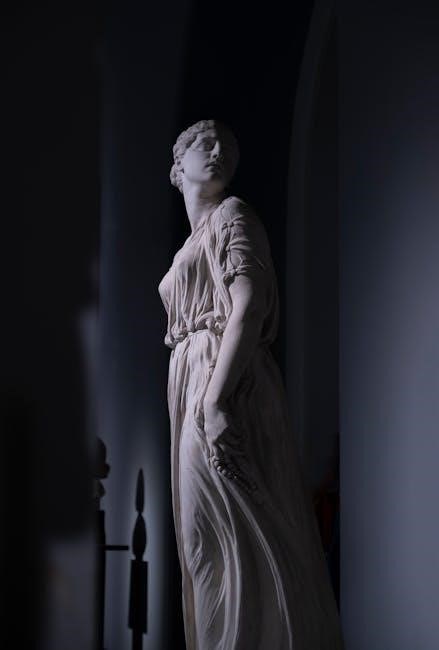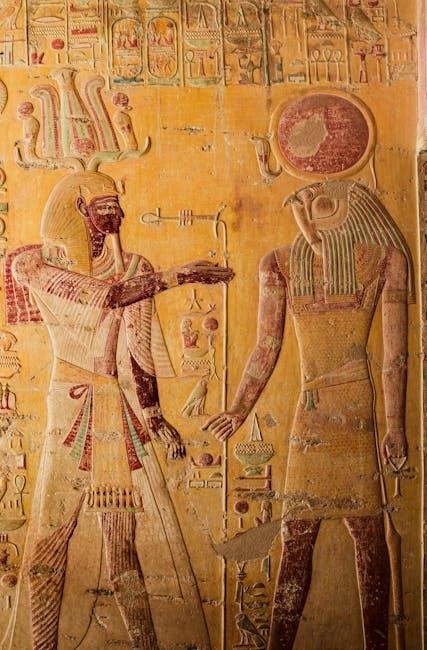Who Let the Gods Out? by Maz Evans is a captivating tale of Elliott Hooper, a boy who accidentally releases Thanatos, a death daemon, and enlists Olympian gods to save the world. The PDF version offers an accessible way to enjoy this mythological adventure blending humor and heart.
Overview of “Who Let the Gods Out?”
Who Let the Gods Out? by Maz Evans follows Elliott Hooper, a boy who accidentally releases Thanatos, a powerful death daemon, while exploring Stonehenge. Seeking help, Elliott and his friend Virgo, a Zodiac goddess, turn to retired Olympian gods like Zeus, who must rise to the challenge of saving the world. This humorous and adventurous tale blends Greek mythology with modern themes, offering a unique twist on classic myths for middle-grade readers.
Importance of the PDF Version
The PDF version of Who Let the Gods Out? offers a convenient and accessible way to enjoy Maz Evans’ engaging story. It allows readers to access the book on various devices, making it ideal for both casual reading and educational purposes. The digital format ensures portability and ease of use, catering to modern readers who prefer flexibility in their reading experiences while preserving the story’s humor, adventure, and mythological charm.
Relevance of the Book in Modern Literature
Who Let the Gods Out? stands out in modern literature by blending mythology with contemporary themes, appealing to a wide audience. Its unique mix of humor, adventure, and heartfelt moments addresses mental health and family dynamics, resonating with today’s readers. The book’s ability to reimagine Greek mythology in a modern context makes it a fresh and engaging read, contributing to its popularity in middle-grade and young adult genres.
Plot Summary
Who Let the Gods Out? follows Elliott Hooper, a boy who accidentally releases Thanatos, a powerful death daemon, while trying to solve his family’s problems. With the help of Virgo, a Zodiac goddess, Elliott must enlist the aid of retired Olympian gods like Zeus to stop Thanatos and save the world, blending mythology, humor, and adventure in a thrilling quest.
Main Characters and Their Roles
Elliott Hooper is the protagonist, a young boy facing family challenges who accidentally releases Thanatos. Virgo, a determined Zodiac goddess, joins Elliott on his quest. Zeus and other Olympian gods, retired on Earth, are drawn into the adventure, bringing their legendary powers and personalities to the battle against Thanatos. Together, these characters drive the story, blending humor, mythology, and personal growth in a thrilling narrative.
The Release of Thanatos and Its Consequences
The accidental release of Thanatos, a malevolent death daemon imprisoned beneath Stonehenge, unleashes chaos and peril. Elliott and Virgo’s mistake sets off a chain reaction, threatening the world’s balance. The daemon’s freedom forces the duo to seek help from the Olympian gods, who must reclaim their former glory to save humanity and restore order. This pivotal event drives the story’s tension and adventure, highlighting the stakes of their actions.
The Involvement of Olympian Gods
Zeus and the Olympian gods, retired on Earth for centuries, are drawn into Elliott’s crisis. Relishing the chance to reclaim their former glory, they join forces with Elliott and Virgo to combat Thanatos. Their involvement injects humor and power into the story, as these once-mighty deities adapt to modern challenges, proving their enduring relevance and strength in saving the world from destruction.

Themes Explored in the Book
The story delves into mythology, mental health, and family dynamics, blending humor with adventure. It explores personal growth, the power of relationships, and the modern relevance of ancient myths.
Mythology and Its Modern Interpretation
The book creatively reimagines Greek mythology in a modern context, blending ancient tales with contemporary issues. Elliott’s accidental release of Thanatos, a death daemon, sparks a fresh adventure involving Olympian gods. The story humorously explores how mythological figures adapt to the modern world, making ancient legends relatable and engaging for today’s readers. This unique interpretation highlights the timeless appeal of mythology while addressing themes like identity and courage.
Mental Health and Personal Growth
Elliott Hooper’s journey in Who Let the Gods Out? explores themes of mental health and personal growth. The story portrays Elliott’s struggles with anxiety and self-doubt, offering a relatable narrative for young readers. Through his adventures, Elliott learns resilience and self-acceptance, showing how challenges can foster personal development. The book’s lighthearted tone balances deeper emotional themes, making it a powerful tool for discussing mental health in an accessible way.
Family Dynamics and Relationships
Who Let the Gods Out? delves into family dynamics through Elliott’s relationships with his mother and the Olympian gods. Zeus, as a father figure, offers guidance, while Elliott’s bond with his mother highlights the importance of family support. The story explores themes of trust, loyalty, and understanding, showing how relationships shape Elliott’s journey and personal growth. These dynamics add emotional depth to the adventure, making it relatable and engaging for readers of all ages.
Humor and Adventure Blend
Who Let the Gods Out? masterfully combines humor and adventure, creating an engaging narrative. Elliott’s witty interactions with Virgo and the Olympian gods add comedic relief, while the quest to contain Thanatos drives the thrilling plot. The blend of mythology and modern-day antics ensures a lively, entertaining read, making the PDF version a must-have for fans of humorous and action-packed stories.

Character Analysis
Who Let the Gods Out? delves into the complexities of its characters, showcasing Elliott’s resilience, Virgo’s determination, and Zeus’s charismatic leadership. The PDF highlights their growth and interactions, offering insights into their roles in the story.
Elliott Hooper: The Protagonist
Elliott Hooper is a relatable and endearing protagonist whose accidental release of Thanatos sets the story in motion. With the help of Olympian gods, he navigates saving the world and solving personal problems. His journey is filled with humor, heart, and growth, making him a memorable character. The PDF version captures his adventures vividly, emphasizing themes of mental health, family, and self-discovery.
Virgo: The Zodiac Goddess
Virgo, a young and determined Zodiac goddess, plays a pivotal role in the story. Teaming up with Elliott, she aims to fulfill her mission while navigating the chaos caused by Thanatos’ release. Her character adds depth, blending mythology with modern adventure. The PDF version highlights her journey, showcasing her growth and the humor infused in her interactions with Elliott and the gods.
Zeus and the Olympian Gods
Zeus and the Olympian gods, retired and living on Earth, are drawn into Elliott’s chaos. After centuries of leisure, they relish the chance to save the world and solve Elliott’s problems. Their involvement brings both authority and humor, as they navigate modern challenges. The PDF version highlights their dynamic, blending their mythical grandeur with contemporary wit, making them central to the story’s adventure and heart.
Mythological Elements
The book seamlessly integrates Greek mythology, featuring Thanatos, a death daemon, and Stonehenge as a key location. The PDF version highlights these elements, blending tradition with modern storytelling, making mythological concepts accessible and engaging for readers of all ages.
Use of Greek Mythology
The book masterfully incorporates Greek mythology, featuring Thanatos, a death daemon, and Olympian gods like Zeus, who emerge from retirement to aid Elliott. The PDF version highlights how these mythological figures blend seamlessly with modern-day challenges, creating a unique and engaging narrative that appeals to readers of all ages while staying true to mythological roots.
The Role of Thanatos
Thanatos, a wicked death daemon, plays a central role as the antagonist, imprisoned beneath Stonehenge. His accidental release by Elliott and Virgo unleashes chaos, forcing the duo to seek help from Olympian gods. Thanatos embodies darkness and destruction, driving the plot’s conflict and highlighting the stakes of Elliott’s quest to restore balance and save the world from his sinister influence.

Stonehenge as a Key Location
Stonehenge serves as a pivotal location in Who Let the Gods Out?, housing the imprisoned death daemon, Thanatos. This ancient site holds mystical significance, and its connection to Greek mythology adds depth to the story. Elliott and Virgo’s accidental release of Thanatos at Stonehenge sets the plot in motion, showcasing the blending of historical and mythological elements to drive the narrative forward.
Series Overview
Who Let the Gods Out? is a series blending mythology, humor, and adventure, appealing to middle-grade readers. It follows Elliott and Virgo, exploring themes of growth and friendship.
Number of Books in the Series
The Who Let the Gods Out? series consists of multiple books, blending mythology, humor, and adventure. With 18 entries, it captivates middle-grade readers, offering a fresh take on Greek myths. The series follows Elliott and Virgo as they navigate gods, daemons, and personal growth. Available in PDF, the series is easily accessible, making it a popular choice for young readers seeking thrilling and heartfelt stories.
Target Audience and Genre
Who Let the Gods Out? is primarily aimed at middle-grade readers aged 8-12, blending fantasy, adventure, and humor. The series also appeals to young adults due to its relatable themes of mental health and personal growth. With its unique mix of Greek mythology and modern-day challenges, the book falls under the fantasy and adventure genres, making it a compelling read for fans of mythological storytelling.

Reception and Reviews
Who Let the Gods Out? has garnered positive reviews for its unique blend of mythology, humor, and relatable themes. The PDF version is widely popular, offering easy access to this captivating tale of adventure and personal growth, resonating with readers of all ages.
Reader Feedback and Ratings
Readers praise Who Let the Gods Out? for its engaging storyline and relatable characters. The PDF version has received high ratings, with many appreciating its accessibility. Fans highlight the blend of mythology, humor, and emotional depth, making it a favorite across age groups. The book’s ability to balance adventure with personal growth resonates deeply, contributing to its widespread popularity and positive reviews.
Critical Acclaim and Awards
Who Let the Gods Out? has garnered significant critical acclaim for its unique blend of mythology and humor. The book has been praised for its creative storytelling and emotional depth, resonating with both children and adults. It has been nominated for several prestigious awards, including the Waterstones Children’s Book Prize, and is widely regarded as a standout in modern children’s literature. The PDF version has further expanded its reach, making it accessible to a global audience.
Popularity and Cultural Impact
Who Let the Gods Out? has become a beloved series, captivating readers with its blend of mythology, humor, and adventure. The PDF version has enhanced its accessibility, making it a favorite among middle-grade readers and young adults. Its unique storytelling has fostered a dedicated fan base, with readers praising its ability to merge ancient myths with modern themes. The book’s cultural impact is evident in its growing community of enthusiasts and its role in inspiring a love for reading.
Educational Value
Who Let the Gods Out? enhances literacy skills and engages students with its blend of mythology and modern themes. The PDF version supports educational use, fostering a love for reading and learning through its accessible format and compelling storytelling.
Use in Schools and Curriculum
Who Let the Gods Out? is widely integrated into school curricula for its engaging blend of mythology, humor, and modern themes. The PDF version aligns with learning objectives, making it ideal for classroom use. It supports topics like Ancient Greece, mental health, and literacy development. Resources from platforms like Literacy Shed Plus complement the book, enhancing its educational value and accessibility for teachers and students alike.

Literacy Development and Engagement

The PDF version of Who Let the Gods Out? enhances literacy development by offering an engaging narrative that blends mythology, humor, and adventure. Its accessible format, available on platforms like OverDrive, encourages reluctant readers to explore complex themes. The book’s dynamic storytelling and relatable characters foster a deeper connection with reading, making it an excellent tool for developing literacy skills and sparking a love for literature in young readers.
Availability of Educational Resources
Educational resources for Who Let the Gods Out? are widely available, including lesson plans and activities on platforms like EdShed and The Literacy Shed. The PDF version, accessible via OverDrive, supports classroom integration, while teaching guides offer creative ways to explore the book’s themes. These resources make it easier for educators to incorporate the story into curricula, enhancing both teaching and learning experiences for students.

Author Background
Maz Evans, author of Who Let the Gods Out?, blends mythology with modern humor. Her engaging writing style and relatable characters have captivated readers worldwide.
Maz Evans: Biography and Writing Style
Maz Evans is a British author known for her imaginative storytelling and humor. With a background in scriptwriting, she brings dynamic dialogue and vivid characters to her work. Her writing style blends mythology with modern-day issues, creating relatable and engaging narratives. Evans’ ability to weave adventure with emotional depth has made Who Let the Gods Out? a beloved read for middle-grade audiences and beyond.
Interviews and Public Appearances
Maz Evans frequently engages in interviews and public events, discussing her creative process and the inspiration behind Who Let the Gods Out?; She shares insights into blending mythology with modern themes and her passion for storytelling. Evans also participates in school visits and literary festivals, connecting with readers and fostering a love for reading in young audiences.
Cultural Impact
Who Let the Gods Out? has captivated readers with its unique blend of mythology, humor, and adventure, resonating with middle-grade audiences and young adults worldwide. Its PDF availability has enhanced accessibility, fostering a dedicated fanbase and inspiring creative interpretations across social media and educational platforms.
Fandom and Community Engagement
The Who Let the Gods Out? series has inspired a vibrant fanbase, with readers creating fan art, hosting discussions, and sharing creative interpretations online. The PDF version’s accessibility has further fueled engagement, allowing fans to easily share and reference the book. Social media platforms and educational forums are filled with enthusiasm for the series, fostering a sense of community among readers who connect over its blend of mythology, humor, and adventure.
Adaptations and Merchandise
The popularity of Who Let the Gods Out? has sparked interest in potential adaptations, such as audiobooks or films, bringing its mythological world to life. Merchandise like posters, apparel, and themed accessories is also emerging, catering to its growing fanbase. The PDF version’s widespread availability has further fueled creative engagement, inspiring fan-made content and fostering a deeper connection with the story’s unique blend of humor, adventure, and mythology.

PDF Version Details
The PDF version of Who Let the Gods Out? is available on OverDrive and other platforms, offering an accessible and convenient reading experience for fans worldwide.
Availability and Access
The PDF version of Who Let the Gods Out? is widely available on platforms like OverDrive, Audible, and select online bookstores; Readers can access it for free through library subscriptions or purchase it directly. The digital format ensures convenience, with adjustable fonts and night mode for a comfortable reading experience. Its accessibility makes it a popular choice for fans of mythology and adventure worldwide.
Advantages of the Digital Format
The PDF version of Who Let the Gods Out? offers unmatched convenience, allowing readers to access the story anytime, anywhere. Adjustable fonts and night mode enhance readability, while the digital format saves space and reduces environmental impact. It’s ideal for modern readers seeking flexibility and comfort in their reading experience.
Where to Download or Purchase
The PDF version of Who Let the Gods Out? is available for download or purchase through platforms like OverDrive, Audible, and select online bookstores. Readers can also access it via subscription services such as LitShed Resource or by visiting the author’s official website. Additionally, the book can be found on blogs like Gobooksproz.blogspot.com, ensuring easy accessibility for fans of Maz Evans’ work.
Who Let the Gods Out? is a delightful blend of mythology and humor, making it a must-read for middle-grade readers seeking adventure and heart. Its unique storytelling and relatable characters ensure an engaging experience for all ages.
Final Thoughts on the Book’s Significance
Who Let the Gods Out? masterfully blends mythology, humor, and adventure, offering a fresh take on ancient myths. Its relatable characters and modern themes make it a valuable resource for engaging young readers while exploring complex ideas like mental health and family dynamics. The PDF version ensures accessibility, making this captivating story reachable to a wider audience, solidifying its place in contemporary children’s literature.
Recommendation for Potential Readers

Who Let the Gods Out? is a must-read for fans of mythology, humor, and adventure. Ideal for middle-grade readers and young adults, it offers a fresh twist on ancient myths with relatable characters. The PDF version ensures easy access, making it perfect for classrooms or personal reading. Its blend of humor and heart makes it a great choice for anyone seeking an engaging and thought-provoking story.